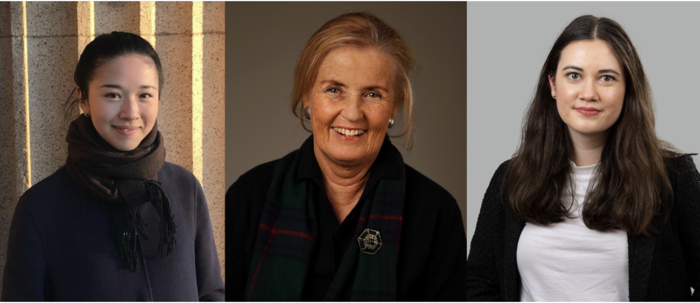Previous events - Page 17
Speaker: Inga Haaland
Department seminar. Ruslana Datsenko is a a PhD student at the University of Oslo.
Department seminar. Eduardo Perez-Richet is an Associate Professor at Sciences Po.
The semantics of pseudo-noun incorporation in an analytic language
Kristin Oxley is a PhD candidate at the Centre for Technology, Innovation and Culture (TIK). In the seminar, she will present the draft of her PhD thesis.
Emily J. Lordi (Vanderbilt) will give a lecture about the life and work of Whitney Houston in the "Word, Sound and Power" Lecture 2024.
Department seminar. Geoffrey Barrows is a CNRS researcher affiliated at the ?cole Polytechnique, France. He will present the paper "Equilibrium Effects of Carbon Policy".
Martin Moland presents the paper New or Old Politics? Understanding public preferences for an EU single market at the Tuesday Seminar on 2 April 2024.
A narrative of pharmaceutical regulation development and its implementation entanglements. Speaker: Peter Mangesho, Institute of Health and Society, UiO
We are thrilled to announce an upcoming event featuring the acclaimed novel "Dancing Amid Fire, Rising Above Ruins" by Essmat Sophie. This event promises to be an engaging and thought-provoking discussion on the themes of identity, intersectional oppression, exile, politics, history, and the marginalized Kurdish community in Iran.
Associate Professor in Philosophy, Joel Krueger, from University of Exeter, will speak at RITMO's Seminar Series
Speaker: Ingvild Bergom Lunde, Institute of Health and Society
Hemispheric and Global Dialogues on the Transnational American West
Department seminar. Alexandre Gaillard is an Assistant Professor of Economics at Brown University. He will present the paper: “Consumption, Wealth, and Income Inequality: A Tale of Tails.”
Where are you going, structural biology? This mini-symposium will focus on the modern use of NMR, CryoEM/ET and AlphaFold in the elucidation of protein structure and function.
Department seminar. Justus Preusser is a a Postdoctoral Researcher at Bocconi University. He will be presenting "Optimal allocation with peer information" (written with Axel Niemeyer).
Could Nora Helmer actually end up in prison after forging her father’s signature? Was Hedda Gabler a true criminal? Join us for an In-house seminar on Henrik Ibsen and the law.
Christopher Lord presents the chapter Taking back Control. How Brexit meant much more than Brexit at the Tuesday Seminar on 12 March 2024.
Department seminar. Astrid Kunze is Professor of Economics at the Norwegian School of Economics in Bergen, Norway. She will be presenting "Parental Leave from the Firm's Perspective".
Welcome to the photo exhibition Women in exile, which explores Kurdish women's experiences of daily life during and after conflict.
Veronka ?rsike Asztalos (University of Szeged) will present her research on Ibsen and Bj?rnson's Hungarian reception.
Department seminar. Stefan Pollinger is and Assistant Professor at Sciences Po, Paris. He will present the paper: "Kinks Know More: Policy Evaluation Beyond Bunching with an Application to Solar Subsidies."
An ethnography of young women’s reproductive futures anchored on the COVID-19 vaccination infertility rumors in Khwisero, Western Kenya. Guest Speaker: Mariam Yusuf, University of Nairobi




















